LCPD Chief Don Dixon On Respect, Excellence And The Challenges Ahead
Don Dixon had to start dealing with the Lake Charles Police Dept. even before he became its chief. The night before he was to assume the post — New Year’s Eve of 2001 — Dixon took a walk around the police department building. When he saw a sergeant manning the phones, he asked him, “Who’s working tonight?”
The sergeant reached into his shirt pocket; removed a small index card and handed it to Dixon, who was mightily confused. Only three names were written on the card.
“Are these different shifts?” Dixon asked.
No, responded the sergeant; those three officers were the only ones on patrol for the entire night.
Imagine it: only three officers working the entire city of Lake Charles on New Year’s Eve from 6 pm to 6 am.
“I was horrified,” says Dixon.
He took the liberty of giving some advice to the sergeant: “If I were you, I’d get some more people on the phone.”
It was an early indication that Dixon was going to have to work on a few things. When he became chief, he says, “the honeymoon was short.” On his third day in the post, an officer was arrested when it was found that money was missing from the evidence room.
Dixon stayed focused and concentrated on getting the force up to snuff. He now requires a minimum of 10 officers on patrol.
“Our professionalism has risen incredibly,” he says. “We will be respectful.” He tells his officers that when they stop a car full of passengers, they should “treat them as you would your grandmother.”
In addition to giving orders, he works to keep officers motivated and self-confident; he tells them: “You have the one job in the world [in which] you can make a difference in somebody’s life every day.”
Some of the results have been dramatic. Dixon notes that the city’s last unsolved homicide took place five years ago. “There’s no greater feeling than to bring in the family of a homicide victim to give them closure.”
Such a high rate of case closures is indicative of a strong work ethic. “These men and women, they’re incredible,” says Dixon. “We don’t rest.”
Police are also given challenging goals to work towards. “The word ‘average’ is not in my vocabulary,” says Dixon. “I don’t expect ‘average’; I expect ‘exceptional.’ When you’re getting your door kicked in at 3 in the morning, you want an exceptional guy to show up.”
In his first three months as chief, he says, eight of 10 calls he received were “bad.” Now, he says eight of ten calls are “good.”
The Pay Problem
But Dixon must still deal with the challenges and problems that face any police department from time to time. At the moment, one of the big problems is police pay.
“We hire such great people,” he says. “We don’t do enough to retain them.”
When Dixon became police chief in 2001, first-year hourly pay for a police officer was $9.29. After a month in uniform, this was supplemented by $300 from the state each month.
In the 13 years since, the base pay rate for a new officer has increased to $15.17 an hour. The first month, this is supplemented by $200 from the City of Lake Charles; in the second month, the state takes over with a $500 monthly supplement.
After a year of service, base pay climbs to $18.05 an hour.
Many of Dixon’s officers work side jobs to cover family expenses. This practice creates stress, as the officers are forced to spend inordinate amounts of time away from family.
Dixon recently lost a staff sergeant to the state police; he lost another key officer to a local bureaucracy. The lost officers liked working on the L.C. force; they left because of pay, and nothing more.
Dixon anticipates further defections by law enforcement agents to the FBI or to the wealthy private businesses that will be searching for employees when the business boom really kicks in.
‘My Last Goal’
Dixon is locked into one more term as chief. These days, he’s pondering the question of whether he’ll stay on longer. When the term ends, Dixon will be 68.
He says that as of now, he feels his “last goal [as chief of police] is to see these officers get a raise [that will enable us] to retain them.”
Right now, he’s falling short of his potential allotment of law enforcement employees; he has 180 of 189, which leaves him “nine officers down.” The biggest effect of this lack is that the LCPD is down two officers per patrol. As if to emphasize the seriousness of the matter, Dixon says emphatically, “It’s true.”
Let’s get to some specifics about what could be done to improve the pay situation. Dixon thinks the ideal starting salary for a Lake Charles police officer would be $18 an hour.
But how to get there? Dixon envisions a small tax increase for Lake Charles. The new money would fund not just police pay increases, but also infrastructure improvements (in anticipation of the business boom) and increases for other municipal employees. Dixon believes these employees will also be sought by the companies taking big roles in the boom — companies with very deep pockets.
A 1/4-cent tax raise would, he says, simply bring Lake Charles up to the level of the municipal taxes paid by other big cities in the state.
“If you want excellence in your service,” he says, “you’re going to have to pay for it … I have all the confidence in the world that the mayor, city council [and other municipal entities] will find a way to pay.”
He thinks the threat of losing good city employees of all sorts to wealthy private companies undertaking projects in the area is very real. Like many local leaders, Dixon has been talking with leaders of Odessa, Texas, which recently underwent a boom similar to the one expected here. He says the leaders told him, “we thought we were prepared, but we weren’t prepared.”
Odessa offered its employees free child care and annual pay raises. But that wasn’t enough to keep many Odessa city workers from migrating to jobs with the big private industries undertaking big building projects in the city.
The next tryout for potential Lake Charles officers will take place Jan. 10, 8 am, at the Civic Center. The timing is ideal for those who want to be part of the effort of preparing the area for the boom.
‘The Storm’
Dixon generated some local media buzz a while back when he referred to the business boom with the phrase “a storm is coming.”
He seems pretty confident when it comes to diagnosing the crimes and other situations that police will have to deal with as “the storm” moves in.
He notes that local traffic crashes increased 10 percent in 2014. In the last two months of that year, the increase was 30 percent.
There’s also been a slow rise in crimes against property in recent months.
As the influx of workers increases, additional problems will arise; the problems will become those of “unattached males” who are “letting off steam. After [working] hours, things start happening.”
Some of us remember the problems that arose in the wake of Rita. As to whether these will become even more pronounced during the boom, we’ll have to wait and see. A confident Dixon says, “We’ll handle it.”
The Juvenile Challenge
Before Dixon ever wore the badge of the Chief of Police in Lake Charles, he spent 30 years in the FBI.
That prepared him for a lot of things. One thing it didn’t prepare him for was the bumper crop of adolescent crime in the Lake Charles area. Agents don’t deal with juveniles in the FBI.
Thus, Dixon faced a particularly demanding personal challenge when it happened that the perpetrator of the very first murder committed on his watch as Police Chief was a 17-year-old.
That was 13 years ago. Today, Dixon feels he has a firm enough grasp on the situation to enable him to address audiences of school students on a regular basis.
He says that when he asks them what the biggest problems in their schools are, they always answer that two problems stand out: drugs and violence.
During our interview, Dixon walked me through a series of three hypothetical situations he poses to audiences of students. First, if you saw a student put a 10-pound bag of marijuana in his locker, how many of you would do something? Dixon shocked me when he said that not one student has yet raised his or her hand in response.
The next question is: If you saw a student put a gun in his locker and say he planned to use it in a revenge shooting of another student, would you take action? In this case, a few students raise their hands.
Finally, the third hypothetical situation is: If the student put his gun in his locker with the intention of shooting your brother or sister, would you take action? In this case, almost all students raise their hands.
But when Dixon asks what action the students would take, they simply say they would tell their brother or sister to leave the school.
Dixon points out to the students that by not informing the police of such matters, they’re surrendering their power to affect the situation, and are choosing to take a passive, inactive stance.
He’s sending a message that such an approach does nothing to empower potential teenage victims or to slow down the brisk rate of adolescent crime.
Dixon feels that the predominance of adolescent crime in this and many other urban areas reflects the fact that things have changed in a fundamental way. Many of the adolescents who come to crime by a variety of paths “come from broken homes” and have “no influence by a [mature] male.” The families routinely have substance abuse problems.
As a result of these bad influences and lack of good influences, the adolescents themselves wind up having low self-esteem. They lack religious values. They have, says Dixon, “no discipline, no accountability and a lack of respect.”
When such personalities develop, he says, “bad things are going to happen.”
He tells the students he addresses that “a lack of respect is a road to failure.”
Territorial Gangs
Any discussion of adolescent involvement in crime is bound to lead to discussion of gangs. I told Dixon of my surprise at how little gang activity there appeared to be in the city given its location on an interstate and proximity to big cities.
“I haven’t seen national gangs take hold here,” he said. He feels that local youths who are the sort who tend to be involved in major gang activities simply go to Houston to get the drugs or other contraband they want. The gang activity in Lake Charles, says Dixon, is mainly “territorial,” and not concerned with organized crime.
However, in the last couple of years, Houston gangs have affected the life of the city. Recently, in a relatively short period, members of three different Houston gangs entered Lake Charles to engage in criminal activity.
The first gang (the 103s) robbed a series of high-end homes in south Lake Charles; the second Houston gang attempted the robbery of the Radio Shack in Sulphur; and a third Houston gang (the 105s), attempted to rob pharmacies in the area.
All members of the gangs were arrested. Dixon thinks the message that “our D.A. is not cutting deals” probably got back to Houston.
‘Something Is Not Working’
Dixon was bothered that one of the Houston gang bangers traveling about in Lake Charles was a repeat offender with a long criminal record.
Dixon sometimes uses the word “broken” to describe his sense that something has gone wrong with the justice system. This broken aspect of the system seems to be most evident in the case of criminals who habitually break the law, and are, in turn, habitually bailed out or routinely released from prison without due consideration of their record.
A good example can be found in the recent highly publicized robbery of citizens that took place in front of the Cathedral of the Immaculate Conception downtown. Dixon says that some time ago, the perpetrator robbed eight people in the space of 30 hours. For this he was sentenced, and, after 10 years in jail, was released in October of last year. Between his October release and the Cathedral robbery, he was believed to have robbed five more people.
“For certain individuals who have committed certain crimes, there should be no bond,” says Dixon. For those who are “out on bond on a felony and get arrested, there should be no bond.”
He feels that the system seems to have a problem when it comes to “dealing with repeat offenders,” and is disturbed by the number of “plea deals” that are negotiated. He notes the cases of suspects who are facing seven or eight charges, and somehow manage to have all but one thrown out. “Something is not working,” he says.
The Right To Protest; The Right To Own
As for the recent series of protests about controversial police and grand jury actions around the country, Dixon says, “I try to learn from what happens elsewhere.”
He sees part of the situation as a conflict between two rights. “I firmly believe in the First Amendment. But I just as firmly believe in the right of storeowners” to own, open and run their places of business.
The first right can’t be allowed to infringe on the second. And Dixon takes it further than that. “Looting, burning,” he says, “is dishonoring Michael Brown and Eric Garner. Where does that make sense?”
When I tell Dixon I have a hard time imagining a riot in Lake Charles, he reminds me that there was next to no looting in the city during Rita. “People here did not want chaos; did not take advantage. It’s a great community. It comes together constantly to help those less needy.”
Rita
Although Dixon probably reminisces about several milestones of his 13-year tenure as chief, the one that seemed to come to his mind most readily was that of the performance of the LCPD during Rita.
“I think this agency hit a grand slam. We were not going to let what happened in New Orleans happen here.”
After the hurricane hit, Dixon recalls, the assessment delivered in his early talks with Entergy was dire. The city, Dixon was told, was 100 percent off the energy grid. Electricity wouldn’t be fully restored for weeks.
Obviously, nights in Lake Charles were going to be very dark. “I knew whoever controlled the night would win,” says Dixon.
The entire force that was scheduled to work did work. The three or four isolated cases of looting were dealt with quickly. Hurricane debris wound up posing a greater risk for police than looting. Every cruiser had at least one tire blown by the roofing nails in the roads.
‘I Love A Challenge’
Dixon moved to Southwest Louisiana in 1988. He already had 10 years of FBI work in New York under his belt.
For 14 years, he worked for the FBI in Lake Charles, helping to cover the five-parish area that makes up Imperial Calcasieu. As part of his job, he worked in tandem with the state SWAT team.
Although Dixon became an FBI agent when he was 24, he knew many years earlier — when he was a young child watching Jimmy Stewart perform in the movie The FBI Story — that he would one day be an agent.
Of his FBI work, he says, “That was the greatest 26 years of my life. Life’s a challenge. I love a challenge.”
He says his work as Chief of the Lake Charles Police has, in fact, been a challenge. But, he adds, “the fire is still burning.”
He remains proud of the fact that during Rita, he never had one person miss duty.
“I have a very loyal team. They have my loyalty.”



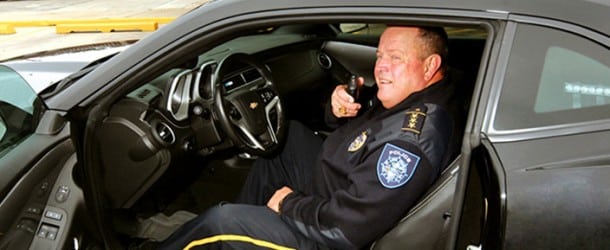

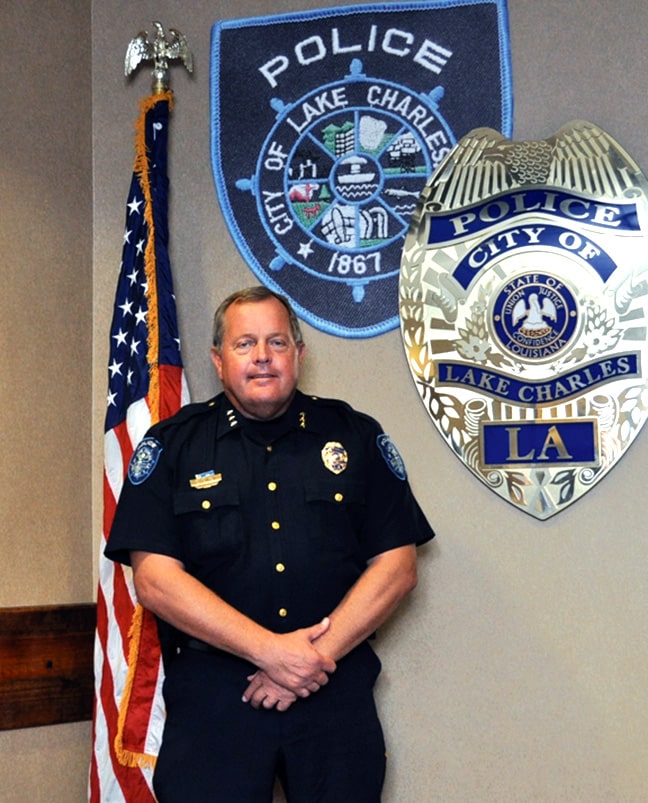
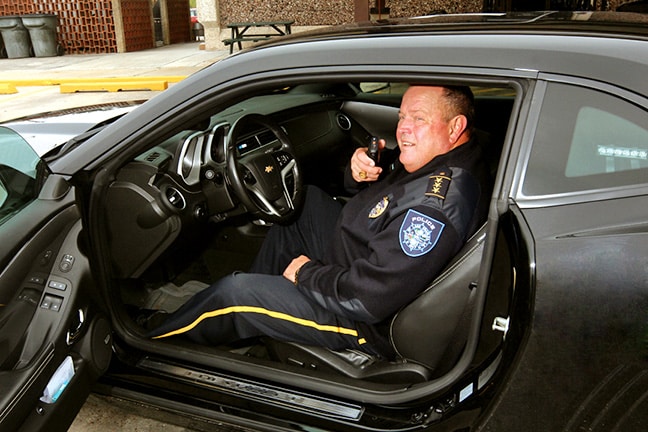

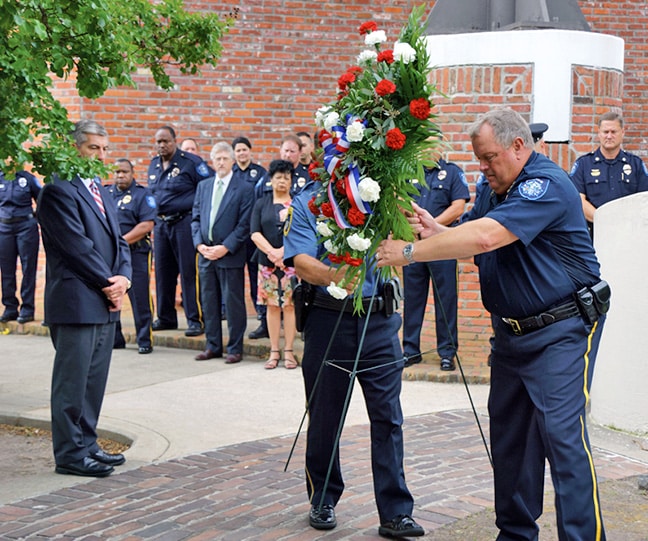
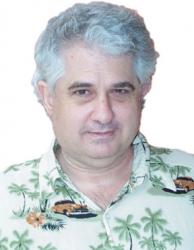











Comments are closed.